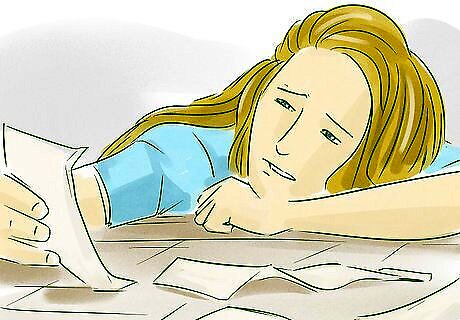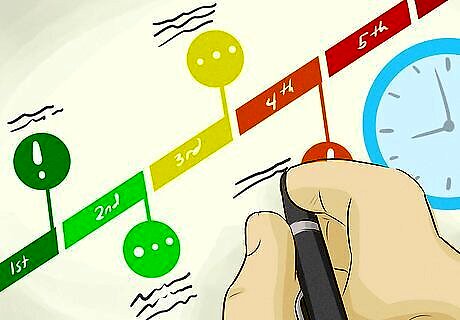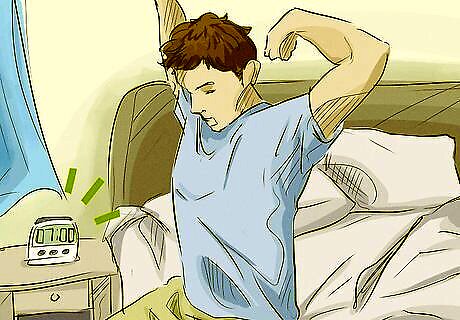
views
Getting Motivated

Find reasons to stay active. A major reason for laziness is a lack of motivation. You can be discouraged by a daunting pile of tasks, or a feeling that the challenges of your day simply aren't worth motivating yourself for. Think of the big picture. It can be easy to get lost in the day-to-day tasks of life and not realize what you're working toward. Take some time out of each day to remind yourself how the task at hand is contributing to larger goals for your life. These can be financial, fitness, or education goals that will help your career and personal life. Make a list of reasons why you want to accomplish tasks before you.

Celebrate success and milestones. You may feel less motivation to do something if it feels insignificant. Stay optimistic and when you complete a task, give yourself a pat on the back. This will also help keep you from being lazy because you are seeing the fruits of your labor. Whether it's exercise, school, or work, make sure you have objective, achievable goals along the way. Write them out and check them off when you accomplish them.

Don't beat yourself up. Laziness can be a self-perpetuating cycle. It can be a type of self-loathing. When you are lazy and fail to complete a task, you can sink into a depression that makes you less likely to keep pushing. Try replacing the negative thoughts in your head with positive ones. For instance, you might tell yourself repeatedly that you are a person of action. Visualize yourself as a hardworking person finishing all the necessary tasks at hand. Do this every day for 30 days until it becomes a habit. Make time for relaxation. There is a tendency to always associate inactivity with laziness. This produces guilt and can perpetuate more laziness. Rather than beat yourself up, allow yourself time to relax with no guilt.

Encourage accountability. Rather than go at everything alone, put yourself in a situation where peers and family can help motivate you. Group accountability is great motivator for staying fit, staying on task, and moving toward goals. If you're trying to get in better shape, find a gym buddy or an exercise class. It will feel like you are letting others down if you skip and you are more likely to keep at it. If it is a school goal, find a friend in the class that can help you study and stay on track with achieving grades you want.
Reducing Procrastination

Recognize that you're procrastinating. Sometimes part of procrastinating is filling our day up with so many side tasks that we have difficulty seeing what we are really doing. Look for useful indicators that you're procrastinating that include: Sitting down to do something important and then deciding to get coffee or a snack. Filling up your day with low priority tasks. Re-reading memos or e-mails many times before deciding what to do with them.

Schedule your day. Many people are inclined to make to-do-lists. However, these can make your day seem daunting and without being tangibly incorporated into your day are little more than wishful aspirations. You need to consider how much time you have and how long each task will take in order to effectively get moving and avoid a day of laziness. Make sure you actually account for how long tasks will take you. This reduces the chance you will procrastinate because you are working along a tangible schedule. Also, realize that things may come up that alter your schedule. This is okay. All you need to do is add this to the schedule and adjust your day. Set boundaries. People who are prone to procrastination should avoid blending life/work boundaries. Assuming you will end each work day at 5:30 P.M. forces you to be productive within a certain timespan.

Do fewer things well. You may procrastinate when you feel like there are too many things to do and you shouldn't bother even starting. Most people believe that they are working harder than they actually are. This is because people feel so overwhelmed and fragmented by endless tasks. We live in a world of constant stimulation and information. Simplify your life and you'll be less likely to be overwhelmed into inactivity. Try media fasting for a week. Not all the information that we consume everyday from all kind of media is useful. Unless it's required for you to consume certain information for your work, stop everything else for a week. No TV, no newspaper, no social websites, no leisure Internet surfing, no watching videos on the Internet. You might want to create your own rule for this tip.

Make it a habit to do anything simple as soon as you see it. For example, if you see a stack of papers need to be dumped, dump into the bin it straight away. It is not important but sooner or later you have to do it. Make it a habit to do it now and you'll stop having an endless list of tasks to do later. This will be hard at first, but it will help you to build a good habit. The tendency to put things off until later can snowball procrastination and laziness.
Starting the Day Right

Start your day right. Don't hit the snooze on your alarm or go back to sleep but get right out of bed to start your day on the move. You are more likely to get and stay energized by starting your day out active. This can take practice to make it a habit. Try placing your alarm clock out of arm's reach. This will insure that you need to actually physically get out of bed before hitting the snooze.

Get plenty of rest. You are more likely to start your day out groggily if you are sleep deprived. This can also hurt your motivation and your ability to not be lazy the following day. Get plenty of rest to make sure you're at your best when you get up in the morning, feeling rested, rejuvenated, and ready to start your day! Everyone needs different amounts of sleep to function their best but shoot for at least six or seven hours. Put away all electronics and screens when you're winding down for bed. Try to get as comfortable as possible and block out any possible distractions that will keep your mind moving.

Start your day out on the move. Exercise first thing in the morning. This will help your energy level remain high and take advantage of peak hormone times. Exercise is also proven to help concentration and focus for the rest of the day. Don't skip breakfast. Breakfast has physiological benefits, but also mental and mood improving effects. Eating a healthy breakfast will help your energy level stay up, your brain function peak, and even improves memory and concentration.




















Comments
0 comment